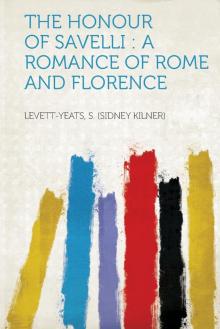


The Honour of Savelli: A Romance
S. Levett Yeats

Produced by Charles Bowen, from page scans provided by Google Booka
Transcriber's Notes:
1. Page scan source: https://books.google.com/books?id=jQM1AAAAMAAJ
2. The diphthong oe is represented by [oe].
THE
HONOUR OF SAVELLI
_A ROMANCE_
BY
S. LEVETT YEATS
NEW YORK D. APPLETON AND COMPANY 1895
Copyright, 1895, By D. APPLETON AND COMPANY.
PREFACE.
Is writing this book the Author has made no effort to point a moral;all that has been done is an attempt to catch the "spirit of the trueRomance," and to amuse. The book was partly written in the intervalsof work in India, and was completed during the leisure allowed byfurlough on medical certificate. In dealing with this period ofItalian history, in which the story is set, the Author would say hehas taken Dumas for his model, but hopes that he has worked out hisscheme on original lines; and he has used, as far as possible, thelanguage in which an Italian living in the beginning of the sixteenthcentury would express himself. At the time the book was written theAuthor had not read Mr. Stanley Weyman's brilliant novel, "A Gentlemanof France." Had he done so the style of the present book woulddoubtless have been much improved from the lessons taught by amaster-hand. The Author, in bringing this to the notice of the reader,would humbly add that he is making no challenge to break a lance withso redoubted a knight as the creator of Gaston de Marsac.
CONTENTS.
CHAPTER
I. A Bolt from the Blue.
II. Ruin.
III. Madame D'Entrangues.
IV. A Fool's Cap and a Sore Heart.
V. D'Entrangues Scores a Point.
VI. Bernabo Ceci.
VII. The Garden of St. Michael.
VIII. Temptation.
IX. The Marzocco Inn.
X. Niccolo Machiavelli.
XI. The Letter to D'Amboise.
XII. The Ambuscade.
XIII. Rome.
XIV. George of Amboise.
XV. The Gift of Bayard.
XVI. Friend or Foe.
XVII. The Vatican.
XVIII. The Opal Ring.
XIX. Exit the Ancient Brico.
XX. "A Brown Paul--a Little Copper."
XXI. The Rescue of Angiola.
XXII. The Ride to St. Jerome.
XXIII. The Pavilion of Tremouille.
XXIV. Too Dearly Bought.
XXV. The Vengeance of Corte.
XXVI. Concerning many Things.
XXVII. My Lord, the Count.
PRELUDE.
I.
He rydes untoe ye Dragon's Gate, And blowes a ryngynge calle: A gallant Knyghte in armoure bryghte, 'Twere sadde toe see him falle. Deare Sayntes of Mercy steele hys harte, And nerve hys arme withalle!
II.
Noe glove bears he uponne hys creste, And lettynge droppe hys visor's barres, I sawe hys starke soule lookynge forthe, Toe meete ye whysperes of ye starres. True Knyghte of God, whose arme is stronge, Whose harte is pure, whose lance is longe.
III.
Lette wyn, lette lose, belyke 'tis true, Ye issue of ye daye will bee, Notte toe ye dreamers; butte toe those Who stayke their alle on victorie. Notte to ye skiffes uponne ye streames, Butte ye stronge shippes uponne ye sea.
_Vanity Fair, 12th October, 1893_.














